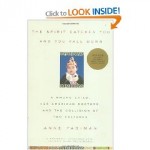The cento is a poetic form composed entirely of secondary (usually poetic) texts. The word “cento” derives from the Latin word for “patchwork,” or “patchwork cloak,” and in its classical form, was composed exclusively of language from either from a single poet or from several. Ausonius, the Roman originator of the form, stipulated that the cento-writer could lift entire verses from another work of poetry or splice verses from separate poems together, but never use two consecutive verses from a poem, nor to extract any less than half a verse from an outside poetic text.
Modern forms of the cento include writing a poem that borrows a single line from another poetic work and echoes that line throughout, stitching together lines, images, or phrases from other poems and using only original prepositions and conjuctions, and (or simultaneously) juxtaposing voices and images from a variety of poetic sources, thus creating a wholly new artistic work. The contemporary cento is generally associated with a certain witty, humorous, or ironic tone, but of course these conventions are subject to (re)invention. For even more explanation and classic and contemporary examples of the cento ranging from Virgil to John Ashbery, see the Academy of American Poets’ entry on the subject.
In my own writing, I have used the cento as a way to rhetorically frame and arrange found language from a variety of sources: interviews, artists’ statements, oral narrative, and lyrically composed prose. Because my writing often clusters around a specific constellation of issues (transculturation, cross-cultural/cross-national encounters, “ethnic” narratives, etc.), these sources generally feature Asian/Asian American subjects or speakers, or those (like Vietnam war veterans or turn-of-the-century “globe-trotters”) whose lives have somehow crossed or complicated a sphere of Asian life.

In the excerpt below, I adapt prose from Anne Fadiman’s The Spirit Catches You and You Fall Down: A Hmong Child, Her American Doctors, and the Collision of Two Cultures (Farrar, Straus and Giroux, 1998) into a lyrical engagement with the beliefs and taboos of shamanistic Hmong practices, which, as Fadiman explores in her book, can result in tremendous misunderstanding—and tragedy, even—when challenged by the conventions of Western medicine.
BLOOD IS FINITE
from The Spirit Catches You and You Fall DownSurgery is taboo. To release a fever,
Scrape the skin with a coin, a spoon, a silver
Necklaces or bamboo. Light the chest
With a sheaf of grass, a wad of cotton wool,
Or a heated cup. Chopped, crushed,
Or mixed with ashes, herbs can be used
To treat burns, fever, poor vision, broken bones,
Arthritis, anemia, rabies, scabies, gonorrhea,
And impotence. Leave them in a cup–
Not for the patient, but the dab.[1]
As I found with this poem, working with found language can be exhilarating to a writer whose personal language world(s) and vocabulary(ies) have begun to feel stagnated or overly recycled. Accessing new systems of thought, image families, and tonal registers through secondary texts can be extremely helpful—and what’s more, contributes to the many ongoing textual conversations that surround us, whether or not we are aware of them.
* * *
Prompt: Write a poem derived from found language. Consider a variety of sources, not just poetry! Newspaper articles, novels (Orientalist novels, even! See my Editors’ Pick on “(Re)Fashioning Japonisme” for some specific perspectives on this unusual genre), medical reports, road signs—the world is rife with strange and subversive texts, and taking them up in poetry can be fascinating. Interact with your texts in a variety of ways; that is, don’t feel pressured to reproduce lines or phrases, exactly, but employ strategies of arrangement and rhetorical framing that will allow you to design a voice (or system of voices) that is unique to your cento, semi-cento, or found poem.
A word on plagiarism. “Borrowing” other poets’ language, when done well and cited correctly, is generally seen as an honorific practice, and can contribute nuance and freshness to previously published work. Do be mindful, however, of attributing credit where credit is due, either through the use of an epigraph (as in my sample poem, “Blood Is Finite”) or a footnote.
As always, please share any experiments/attempts/polished products with the Lantern Review community by posting a response here!
[1] malevolent spirit
One thought on “Weekly Prompt: The Cento, Semi-Cento, or Found Poem”